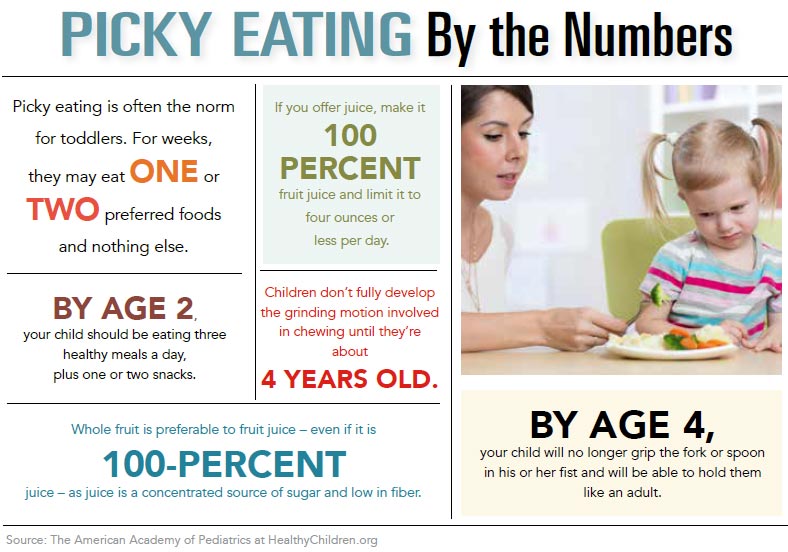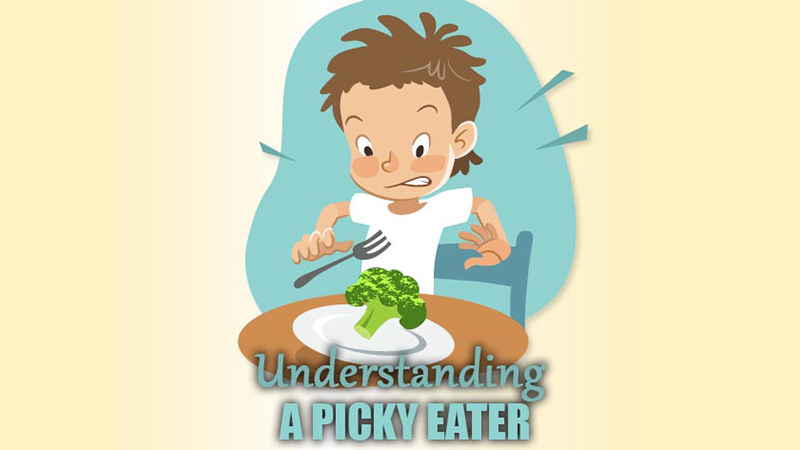Many parents are all too aware of the following nightmare: you prepare a delicious, well-balanced meal, only to have your child refuse to eat any of it. While having a picky eater is sometimes deemed a part of rearing young children, there are often underlying medical reasons for a child who regularly will not eat.
HeatlhLinks Charleston spoke to Dr. Kirby J. Smith, a pediatrician at Parkwood Pediatric Group, as well as Sally A. Asquith, clinical director of Eat Talk Play, LLC, offering feeding, speech and other developmental therapies for children.
HEALTHLINKS CHARLESTON: What does it mean when a child is a picky eater?
SALLY ASQUITH: There are three types of picky eaters. Type one is the classic “food jag” child who is making a stand about what they do or do not want. But those kids are gaining weight. They are still getting proteins, a couple different kinds of vegetables, dairy, fruit and carbohydrates.
The next type of picky eater is a more serious disorder. The kids have failure to thrive. They eat very little, they aren’t gaining weight and their growth curve is either flat or dipping. Kids can actually fall off the growth chart.
Type three consists of kids who fly under the radar. They don’t have a major medical issue, but they will only eat six things, and they’re all soft and squishy.
DR. KIRBY SMITH: The term picky eater most often refers to toddlers who were adventurous eaters as infants but then develop preferred foods and begin refusing others. The food preferences often change weekly – and sometimes daily. Being picky is sometimes not related to food preferences but to a burgeoning sense of independence.
However, the truly picky eaters, who have restricted themselves to three or four food items or specific food textures, usually have medical or developmental problems.
HLC: How is being a picky eater often related to other issues in a child’s health, either physical or behavioral?
ASQUITH: Often, kids have had an event associated with this eating disorder – insufficient pancreatic function, for example, or a hole in the esophagus. So there are medical reasons for eating disorders, such as undiagnosed allergies, poor oral-motor skills or possibly sores in the esophagus. We’ve seen kids who snored, had dark circles and ate only squishy foods. And they all had enlarged adenoids. Of course, the child doesn’t know anything except that it’s normal to feel that way physically.
DR. SMITH: Picky eating habits could be due to reflux, food allergies or intolerance, anatomic or functional problems with swallowing or developmental delays and autism.
HLC: What risks should a parent be aware of when dealing with a child who is a picky eater?
ASQUITH: When a parent is chronically concerned about weight, food variety and nutrition, it’s worth looking at what the quality of food intake is and exploring any issues that are causing or contributing to the problem. We always have to ask ourselves: Why is this kid eating a diet of just mashed potatoes and yogurt? Are they being naughty? Or is there a reason?
DR. SMITH: Malnourishment is a possibility for those with severely limited diets. Children may appear healthy, but if adequate macronutrients such as proteins, fats and carbohydrates and micronutrients such as vitamins, minerals and trace elements are not part of a healthy diet, their bodies will not grow to full potential. On the other side, if children are given free reign on large amounts of junk food, they can become obese.
HLC: What can parents do about a child who is a picky eater?
ASQUITH: One thing that parents can do right away is research a nonprofit called Feeding Matters. It was established by four parents who were desperate for help. It is a marvelous resource and has grown significantly. They have several leaders in the field of dysphagia on the board of advisers as well. The same people who have written books on these topics and developed university programs are sitting on the Feeding Matters board! And the information is free.
DR. SMITH: Family meals help toddlers feel like they are part of the group and are more likely to try foods they see others eating. Sometimes they prefer the food on a parent’s plate to their own, even if it’s the same thing. Games like “here comes the choo-choo” can redirect a child’s focus and make eating fun. As Benjamin Franklin said, “hunger is the best pickle.” Avoiding snacks for 60 to 90 minutes before a meal will allow children to be hungry for the meal that’s offered. At meals, allow children to eat their fill of a variety of healthy foods before offering preferred ones. Parents can carry a variety of healthy snacks so when children are hungry, they have healthy options, instead of the convenient crackers and cookies.
The American Academy of Pediatrics has a website geared toward parents that cover this topic and many others at: https://www.healthychildren.org.
A good book about picky eaters is “Food Fights: Winning the Nutritional Challenges of Parenthood Armed with Insight, Humor and a Bottle of Ketchup” by Drs. Laura A. Jana and Jennifer Shu. Or try “The Picky Eater Project: 6 Weeks to Happier, Healthier, Family Mealtimes” by Drs. Natalie Digate Muth and Sally Sampson.
HLC: What is a doctor’s role in helping parents with a child who will not eat?
ASQUITH: There are many types of professionals that participate in the management of eating disorders: nutritionists, pediatricians, nurse practitioners, lactation consultants, occupational therapists, ENTs and speech-language pathologists. Pediatricians are caring, highly-educated people who choose to support parents and children. Parents can feel confident that their doctor will address the problem.
DR. SMITH: A physician can help determine if the picky diet is due to developmental, medical or behavioral issues. If it is the normal behavior that toddlers go through, a physician should be able to give some suggestions to ensure children learn to eat a variety of foods throughout the week and grow to make healthy choices. If there is a developmental or medical problem, appropriate treatments and referrals to specialists can often help improve a restricted diet.








